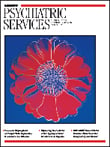Remembering and Appreciating Wayne S. Fenton
Wayne S. Fenton, M.D., was a member of the editorial board of Psychiatric Services at the time of his tragic death in early September. He died literally at the hands of a young patient he was trying to help. Wayne was both a colleague and a friend. He was a dedicated public servant and a very private person. He was a researcher, an administrator, and a clinician who served as associate director at NIMH. We all lost a model psychiatrist and a special man.
This has been a time for remembering losses. The September issue of Psychiatric Services commemorated the mental health consequences of the attacks of September 11, 2001. Our field has lost other leaders who died unexpectedly and prematurely. Nothing can replace these individuals who left us before they could complete their personal missions. We can, however, learn from their lives and emulate their finest attributes.
Wayne's legacy derives from his holistic approach. We could divide his professional accomplishments into those relating to his research, clinical, and administrative work, but that would sever the vital connections. Wayne's early longitudinal studies of the course and symptoms of schizophrenia linked to his later efforts to develop a standardized battery to assess neuropsychological functioning. Both focus on understanding how persons with schizophrenia are living and experiencing the world. Wayne's focus on reliable and valid subtypes in schizophrenia was driven by his need to improve communication among people with schizophrenia, their families, their peers, their doctors and therapists, and researchers. Wayne's drive to connect was the foundation of all of his work.
We learned at Wayne's funeral of his willingness to help install a carpet in the home of one of his patients discharged from Chestnut Lodge. What better way to help a person make a home? We were also struck by Wayne's concern upon arriving at this year's APA meeting in Toronto to get his cell phone to work so that his patients could reach him. The loss of Wayne Fenton threatens to break the web of connectedness that he wove around him. We will miss him terribly. But we honor him by shoring up the linkages he helped us build.
Wayne Fenton's funeral brought together family, friends, patients, advocates, and colleagues to mourn and to celebrate a life devoted to improving the lives of people who experience mental illness. As more than 800 people gathered for the funeral, there was a sense of a community dedicated to the same purpose. While we mourned, we experienced the support of those around us. There was strength in the community along with our grief. And there was hope that Wayne's death would further inspire the pursuit of our common goals.



